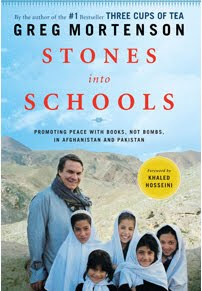A TRUE STORY OF PROBLEMS BECOMING OPPORTUNITIES: Stones into Schools
Over the past 16 years, Greg has learned of the healing power of female literacy. "When you teach a boy, you educate an individual. When you teach a girl, you educate a community." Not only do girls go home and teach their mothers, they also go on to become teachers, doctors, attorneys, and engineers.
We learn that the population explosion is linked to female literacy. As women are educated, infant mortality decreased significantly. And as women can be confident that their children will live past age 5, they choose to have fewer children (from 7 or 8 to 2.3 per woman).
Not only can we address the complex problems of women dying in child birth, infant mortality and controlling world population. Another fascinating link is to jihad and suicide bombers. In the Muslim culture a son must get the blessing of his mother before doing jihad. Rarely will and educated mother give her permission because she knows the Koran forbids murder and suicide. It seems that the Taliban depends on illiteracy to control the minds of the people. And as schools are being built in the most remote areas of Afghanistan and Pakistan, the Taliban is finding it more and more difficult to recruit followers.
This is an engaging story of servant leadership, working through trust, teamwork, and local leaders. The village donates the land and the labor to build each school. Central Asia Institute (CAI), the non-profit founded by Greg Mortenson, then funds the resources.
It is very encouraging to learn that Three Cups of Team, Mortenson's first book, is now required reading for all US military heading for Iraq or Afghanistan. Learning and respecting the culture, earning trust, and working with local people has become the new strategy to establish a sustainable peace in this region. "Drink one cup of team and we are strangers, two and we are friends, three and we are family."
Again and again, as the stories are told, each problem becomes a surprising opportunity. Greg tells how a child in the elementary school where his mother was the principal, offered all in hi piggy bank to help the children in Afghanistan. And from that, now 400+ schools now participate. Pennies for Peace is a program to introduce children to the opportunity to become a philanthropist on behalf of others.
I strongly recommend these book as a fascinating way to learn about the history and complex cultures of this region as well as a very practical true story as t why servant leadership is such an effective form of leadership. These books will inspire you, delight you, and fill your heart with hope that together we can replace war with lasting peace.




